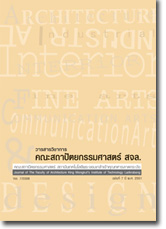วิถีชีวิต วัฒนธรรม ในบริบทสังคมเมืองกับชนบท เมืองคุณหมิง
Main Article Content
Abstract
บทคัดย่อ
บทความนี้เป็นการนำเสนอเนื้อหาสาระที่ได้จากการฝึกอบรมเชิงปฏิบัติการ การวิจัยเชิงคุณภาพ ณ เมืองคุนหมิง ประเทศสาธารณัฐประชาชนจีน ด้วยทุนจากคณะสถาปัตยกรรมศาสตร์ สถาบันเทคโนโลยีพระจอมเกล้าเจ้าคุณทหารลาดกระบัง โดยวิธีการสำรวจ สังเกตการณ์ และวิเคราะห์กระบวนการเปลี่ยนแปลงทางสังคมและวัฒนธรรมจากสภาพแวดล้อมจริง มุ่งเน้นไปที่การทำความเข้าใจของการเปลี่ยนแปลงหรือคงอยู่ของวิถีชีวิต วัฒนธรรม ในบริบทสังคมเมืองกับชนบท
เมืองคุนหมิง เมืองเอกในมณฑลยูนนานที่มีการเติบโตทางเศรษฐกิจอย่างรวดเร็ว ดังส่งผลให้ความเจริญทาง “วัตถุ” ของเมืองถูกสร้างขึ้น ราวกับพลิกผืนแผ่นดิน แล้วเนรมิตทุกสิ่งขึ้นมาใหม่อย่างไร้รากเหง้าทางวัฒนธรรม เพื่ออำนวยความสะดวกสบายให้แก่ระบบธุรกิจ (ทุนนิยม) แต่เมื่อมองลึกถึง “คน” ในสังคมกลับพบว่า ยังคงมีวิถีชีวิต วัฒนธรรมการกินอยู่หลับนอนแบบดั้งเดิม แสดงให้เห็นถึงความเจริญก้าวหน้าที่ไม่เท่าทันกันระหว่าง “วัตถุ” กับ “มนุษย์”
จากเมืองคุนหมิงไปสู่ยังเมืองอี้เหลียง สามารถพบเห็นวิถีชนบทได้จากบ้านที่สร้างด้วยวัสดุธรรมชาติและวิถีชีวิตของชุมชนเกษตรกรรมที่สอดประสานกันอย่างลงตัว แต่ด้วยความเป็นเมืองท่องเที่ยวทางธรรมชาติอันโด่งดัง ทำให้ตัวเมืองอี้เหลียงเติบโตอย่างรวดเร็ว บ้าพนักอาศัยอันเกิดจากภูมิปัญญาชาวบ้านที่เรียกว่า บ้านดิน แทบไม่มีเหลืออยู่ ด้วยเพราะการไม่เห็นซึ่งคุณค่าแนวคิดด้านการอนุรักษ์เมืองเก่าที่จะเกิดขึ้นก็ต่อเมื่อรัฐบาลกลางกำหนดลงมา ถึงแม้จะมีนโยบายในการอนุรักษ์ก็มักเป็นแบบ “เมืองจำลอง” ที่คงไว้แต่เพียงสถาปัตยกรรม ไร้ซึ่งจิตวิญญาณแห่งวิถีการดำรงชีวิต มิได้เกิดจากการผลักดันและความร่วมมือของคนในชุมชนจึงนับว่าเมืองชนบทอย่างเมืองอี้เหลียงก็กำลังตกอยู่ในความเสี่ยงต่อการเปลี่ยนแปลงทางสังคมและวัฒนธรรมเป็นอย่างยิ่ง ปัญหาทั้งหมดนี้ก็ขึ้นอยู่กับรัฐบาลและประชาชนที่จะต้องคิดหาแนวทางแก้ไข การพัฒนาประเทศเหมาะสมและยั่งยืนบนพื้นฐานการเล็งเห็นถึงคุณค่ามรดกภูมิปัญญาบรรพบุรุษของตน
คำสำคัญ : คุณหมิง, สังคมเมือง, สังคมชนบท, การเปลี่ยนแปลงทางสังคมและวัฒนธรรม
Abstract
This paper aims to present the experience from the Qualitative Research Training Workshop in Kunming, People’s Republic of China. This program had been supported by the Faculty of Architecture, King Mongkut’s Institute of Technology Ladkrabang. The research methodology combines; survey, observation and cocio-cultural changing process analysis in the real situation. The research activity emphasizes on the understanding of the changes and remains of the way of life and culture in urban and rural context.
Kunming is the main city in Yunnan administrative region. The rapid economic growth in Kunming makes the rise of “materialism” development which replaced the old homeland without any concern on the cultural route just only to serve the business system (capitalism). While the local people still live in the old way of life and the old traditions still remain which indicate the unbalance between Materialism development and Human behavior.
From Kunming to Yi-Liang, small town in Yunnan Province, we still can see the rural way of life from vernacular houses made from natural materials within the agriculture-based community which fitly settled along each other. Nevertheless, Yi-Liang is a famous tourist attraction with its unique and beautiful natural environment which makes the rapid development within the town. There are a very few numbers of the local wisdom-made dwelling heritage which so-called “Mud Houses” left to be preserved because of the lack of the appreciation of cultural significance values. The concept of historic town conservation had been top-down approached from the central government. The conservation policy had been implementing only to preserve the historic town as a “freezing heritage” which only keeps the architectural heritage without living spiritual instead of the concept “living heritage” which motivate and collaborates among local people to revitalize the collective values as a whole. Yi-Liang is in a high risk and critically facing vulnerability on socio-cultural change in the future.
All problems could be solved with the collaborative process among government and the people to find the best solution for developing the country on the basis of sustainability and wisdom heritage from their ancestor.
Key Words : Kunming, Urban Society, Rural Society, Socio-cultural change
Article Details
This work is licensed under a Creative Commons Attribution-NonCommercial-ShareAlike 4.0 International License.
Copyright Transfer Statement
The copyright of this article is transferred to Journal of The Faculty of Architecture King Mongkut's Institute of Technology Ladkrabang with effect if and when the article is accepted for publication. The copyright transfer covers the exclusive right to reproduce and distribute the article, including reprints, translations, photographic reproductions, electronic form (offline, online) or any other reproductions of similar nature.
The author warrants that this contribution is original and that he/she has full power to make this grant. The author signs for and accepts responsibility for releasing this material on behalf of any and all co-authors.


